Center for Judaic, Holocaust and Peace Studies, Appalachian University, Boone, North Carolina, USA, November 10-14, 2007
Guest Lecturer: Evelin Lindner, invited by Amy Hudnall, Adjunct Instructor, Coordinator of Peace Studies
Center for Judaic, Holocaust and Peace Studies, Appalachian University, Boone, North Carolina, USA, November 10-14, 2007.
Guest lecturer: Evelin Lindner, invited by Amy Hudnall, Adjunct Instructor, Coordinator of Peace Studies, supported by Jennifer Kirby (see pictures above).
|
|---|
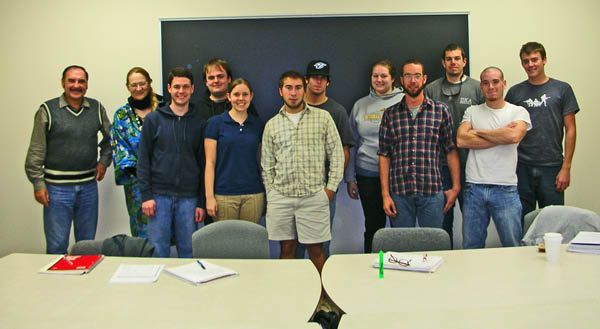 |
1. "The Role of Humiliation in Ethnic Conflicts"
|
 |
2. Dinner with Peter Petschauer, Department of History, Appalachian State University.
|
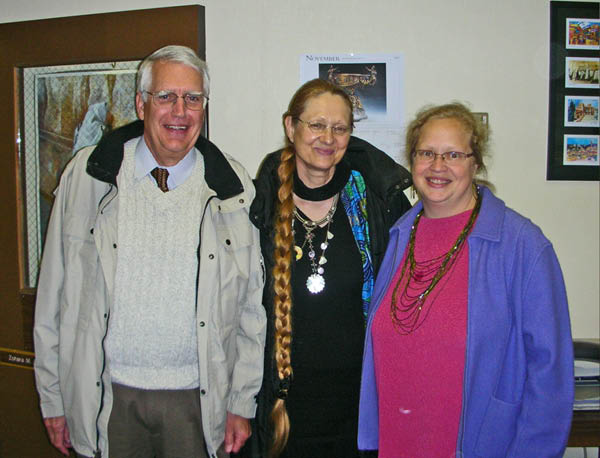 |
3. "The Role of Humiliation in the Holocaust, Germany and Rwanda"
|
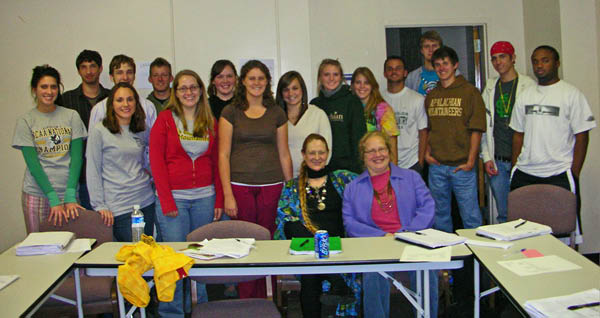 |
4. "On a Personal Level, Genocide, Its Relationship to Humiliation, and How to Prevent It in the Future"
|
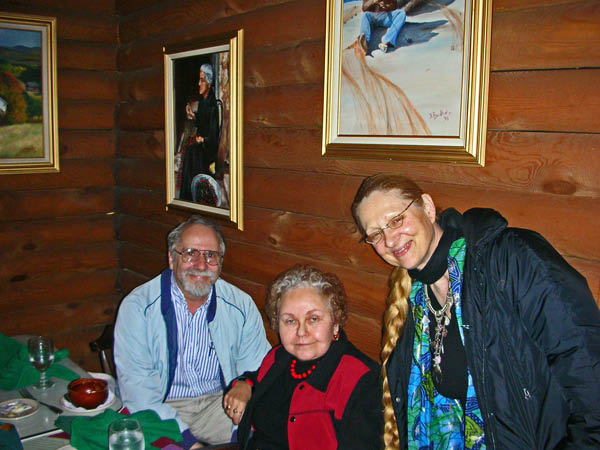 |
5. Dinner with Zohara Boyd, Co-Director of the Center for Judaic, Holocaust, and Peace Studies.
|
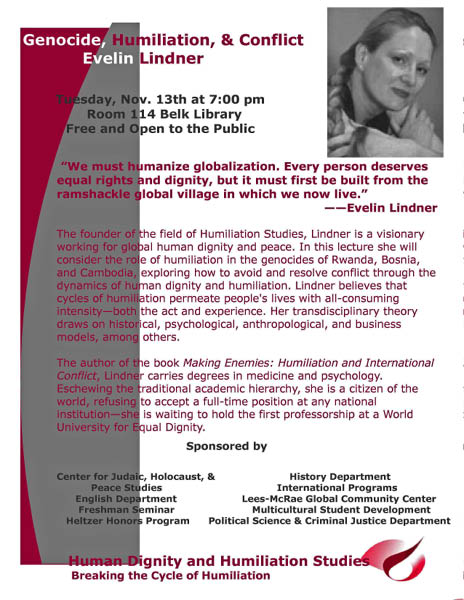  |
6. "Genocide, Humiliation, and Conflict" |
Reactions
Comments from Evelin Lindner (November 24, 2007):
When watching the video of my talk Genocide, Humiliation, and Conflict, I noticed that I omitted many important points, due to time-constraints.
Please let me share with you two important points, at least here, in writing:
1. I should have asked the audience, particularly those with a background in the Middle East and the Arab world, for their understanding and permission that I use the example of honor kilings. Some of my Egyptian friends feel deeply humiliated by me using this example, because they feel that it contributes to portraying Egypt and the Arab world as backwards.
However, this is not my intention. The normative world of honor is, to my view, an adaptation to a certain period in human history (see, e.g., the security dilemma), and this is not something that is specific to the Arab world. I could also use examples from the Western world. Yet, for me, the honor killings dilemma is better suited than any other example to illustrate the predicament that all humakind shares at the present point in its history. The whole world, the Arab world as much as the West, is currently in the process of leaving behind the code of ranked honor and entering a new normative universe, that of equality in dignity. This transition is not smooth, it is haphazard, it is fragmented, and it is often moving one step forward and two steps back - yet, it is happening in all parts of the world.
2. Of course, the idea of equality in dignity for everybody was always alive. It is not a new idea that emerged in 1757. Many founders of religions (Jesus, Islam, the Sikh religion, etc.) had at the core of their message the revolutionary question ("revolutionary" during the past 10,000 years): "Are people really ranked in their worthiness? Are not all people worthy equally much in the eyes of God?" And these founders had followers often precisely because of this revolutionary message of equality in dignity.
However, this message had no real chance to flourish during the past 10,000 years. Typically, hierarchical institutional structures "swallowed up" this message very swiftly.
What is new today is not the idea, the ideal, and the vision of equality in dignity, it is the context that gives this idea historically unprecedented space to finally gain significance and NOT be swallowed. I therefore call the human rights revolution the first continuous revolution in human history.
Ralph E. Lentz II, M. A., Lecturer, History Dept. ASU, kindly wrote on 16/11/2007:
Dear Dr. Lindner,
I was greatly moved and impressed with your presentation Tuesday night at ASU on
your study on the problem of humiliation in human history. As I remarked to you
after the presentation, your research helped me understand what Dietrich
Bonhoeffer meant when he said that "Peace is the opposite of security."
There are many points of convergence between your research and my interests in
theology and history. It seems that one way to facilitate more "egalisation" in
the future it to utilize the quite old Christian doctrines of "Confession" for
perpetrators of humiliation and "Forgiveness" on the behalf of those humiliated.
Both confession and forgiveness require humility and would facilitate the "give
and take" that is necessary to right human relationships of dignity. Desmond
Tutu's "No Way Forward without Forgiveness" speaks to this process that went on
in South Africa.
"The Problem of Evil" is also an area where theological approaches could also
aid in facilitating a different approach to aid/humiliation. Susan Neiman's
"Evil in Modern Thought: An Alternative History of Philosophy" is an excellent
survey of modern Western philosopher's approaches to the problems of evil in
human societies, and also points out the modern West's difficulty in dealing
with evil. Is there something behind humiliation itself that is more
pernicious, more dangerous, and even more universal in creating human misery?
Here is where a theological perspective could shed more light on the damage done
to human souls through humiliation. On the flip side, is there something even
greater, more hopeful, and again, even more universal than "humanity" itself?
This is the hope of theology...
I was very struck during your presentation of how your work dovetails with the
"problem of Empire" as it has been seen by more recent scholars--particularly
"Neo-Marxists". One of the roots for the word "Empire" is from the Latin
"Imperium"--which means the "right to command". This "right to command"
historically has often translated into the "right to humiliate". If we are to
find a solution to the problems of humiliation, we must also solve the problems
of "empire" and their modern manifestations. I haven't read this work, but plan
to on this subject: "Empire" by Hart and Negri (both Neo-Marxist scholars) is
regarded as a very important work on the modern "Post-Colonial" form of "empire"
that grips our world today.
Thank you again for sharing your work and your passion here at ASU. I hope that
I can meet with you again in the future.
Best Regards,
Ralph E. Lentz II, M. A.
Lecturer, History Dept. ASU

